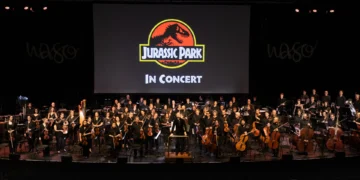There was a time when a new Captain America film meant something. Whether it was Steve Rogers challenging authoritarianism in The Winter Soldier or standing firm against corruption in Civil War, these films carried thematic weight while delivering thrilling action. Captain America: Brave New World had the potential to continue this tradition, especially with Sam Wilson stepping fully into his new role. Unfortunately, while it occasionally flirts with big ideas, the film ultimately crumbles under the weight of its own indecision, half-baked plotting, and the lingering struggle of an MCU still searching for its post-Endgame identity.
Sam Wilson (Anthony Mackie) is no longer just the Falcon — he’s Captain America, and that comes with both privilege and burden. From the film’s earliest moments, it’s clear that Brave New World wants to explore what it means for a Black man to wear the stars and stripes. The film hints at political intrigue, systemic injustice, and the conflict of serving a government that has failed people like him. It even places him in the orbit of Isaiah Bradley (Carl Lumbly, a true standout), the forgotten super-soldier who serves as a living reminder of America’s sins. But that’s all they are — hints. The film lacks the courage to truly commit to these ideas, instead settling into a familiar Marvel formula of shallow commentary, bloated spectacle, and disposable villains.

The plot attempts to weave together multiple threads, from a political conspiracy involving newly elected President Thaddeus Ross (Harrison Ford, mostly sleepwalking through the role) to the discovery of adamantium on Celestial Island. When Isaiah Bradley is framed for an attempted assassination, Sam finds himself caught in a race to uncover the truth while clashing with Ross’ agenda. Along the way, he teams up with his new Falcon sidekick Joaquin Torres (Danny Ramirez) and an Israeli Black Widow-turned-security agent Ruth Bat-Seraph (Shira Haas), all while the shadowy villain Samuel Sterns (Tim Blake Nelson) manipulates events from behind the scenes.
There’s potential in this setup, but the execution is a mess. The script is overstuffed with exposition, spelling out every plot detail as if the audience can’t be trusted to think for themselves. Subplots dangle without resolution, key characters feel underdeveloped, and the central mystery is so poorly constructed that the “big reveal” lands with a thud. Worse still, the film doesn’t seem to understand its own protagonist. Sam Wilson was introduced as a soldier who saw through the government’s lies, yet here he’s strangely eager to trust institutions that have repeatedly betrayed people like him. The ideological tension that could have made this story compelling is sidestepped in favor of a bland, middle-of-the-road approach that tries to please everyone but ends up saying nothing.
That’s not to say the film is completely devoid of merit. Director Julius Onah manages a handful of strong action sequences, particularly an early fight between Sam and Sidewinder (a scene-stealing Giancarlo Esposito). The choreography feels more tactile than the usual Marvel fare, with weighty hand-to-hand combat and dynamic aerial maneuvers. And when Red Hulk finally appears in the final act, the sheer visual chaos of his rampage is undeniably entertaining. But these highlights are exceptions in an otherwise visually uninspired film, hampered by inconsistent cinematography and some of the worst color grading in recent Marvel history.

Perhaps the most frustrating aspect of Brave New World is that it had all the ingredients for something great. A political thriller starring a Black Captain America, navigating a fractured nation and questioning the very institution he represents? That’s an inherently fascinating premise. Instead, the film plays it painfully safe, diluting any real complexity in favor of easy resolutions and unearned sentimentality. Even its most powerful image — Red Hulk rampaging through the White House, a striking metaphor for a burning, broken America — is robbed of its impact because the film refuses to commit to its own subtext.
At the end of the day, Brave New World is yet another casualty of Marvel’s ongoing identity crisis. It’s not the worst the MCU has to offer, but it’s a film that constantly teases depth without ever delivering. Anthony Mackie deserves a better script. Sam Wilson deserves a more thoughtful story. And audiences deserve a Captain America movie that doesn’t just ask important questions but actually dares to answer them.
TL;DR Review
Captain America: Brave New World (2025)
Perhaps the most frustrating aspect of Brave New World is that it had all the ingredients for something great. A political thriller starring a Black Captain America, navigating a fractured nation and questioning the very institution he represents? That’s an inherently fascinating premise. Instead, the film plays it painfully safe, diluting any real complexity in favor of easy resolutions and unearned sentimentality. Even its most powerful image — Red Hulk rampaging through the White House, a striking metaphor for a burning, broken America — is robbed of its impact because the film refuses to commit to its own subtext.
Review Breakdown
-
Unruly Rating

























































